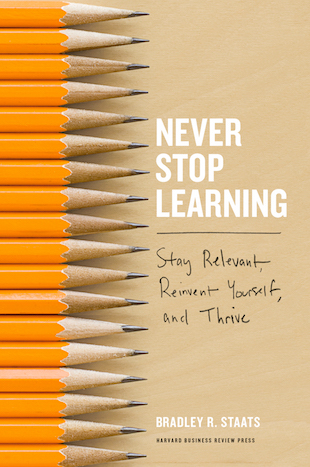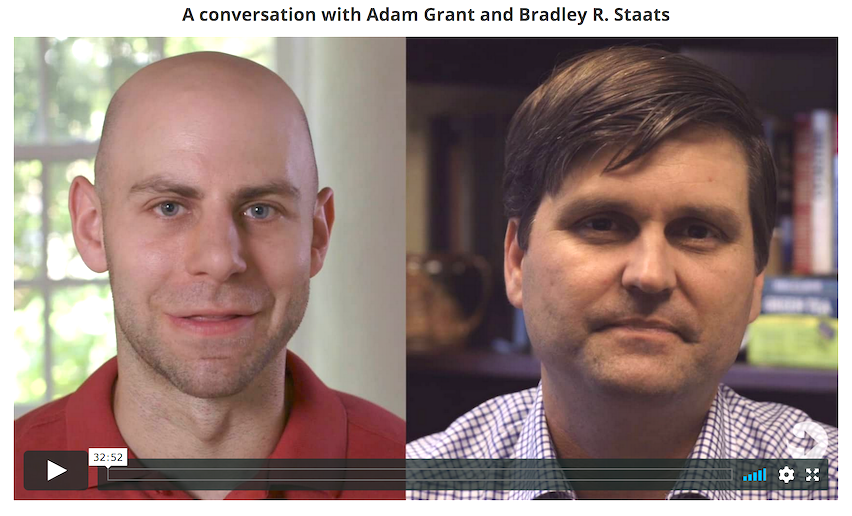“To succeed in this new environment requires continual learning—how to do existing tasks better and how to do entirely new things. If we fail to learn, we risk becoming irrelevant. We end up solving yesterday’s problems too late instead of tackling tomorrow’s problems before someone else does…but, we’re bad at learning. Supremely bad.” – Bradley Staats
I read this unsettling view of human learning in the opening pages of one of the new arrivals from the Next Big Idea Club. The book is titled, Never Stop Learning: Stay Relevant, Reinvent Yourself, and Thrive, and is written by Bradley Staats, a professor at the UNC Kenan-Flager Business School.
 As I read the beginning chapter of the book, I wanted to disagree with Staats’ premise that we are supremely bad at learning. But, I just couldn’t.
As I read the beginning chapter of the book, I wanted to disagree with Staats’ premise that we are supremely bad at learning. But, I just couldn’t.
I remembered David Perkins’ research at Project Zero at Harvard, and I also was reminded of John Medina’s research captured in the book Brain Rules. As Medina points out in his one-minute video, we create and live in environments that can be counterproductive to learning!
In fact, as Bradley Staats notes, we often place learning in the backseat, favoring a workstyle where we are seen as busy: “We want to be seen doing something—anything—so we don’t step back to recharge and reflect” (p. 3).
And, if we don’t reflect, we don’t learn!
Never Stop Learning features a six-part framework to help readers improve their capacity to learn:
- Value failure
- Focus on process, not outcomes – and on questions, not answers
- Make time for reflection
- Play to your strengths
- Pair specialization with variety
- Value others as learning partners
I suspect that many of you nodded as you read the first four steps. The last two steps may not be as familiar, so I’ll focus on those two.
Pair Specialization with Variety
The chapter on pairing specialization with variety begins with a quote from Lev Vygotsky, the late Russian educator who conceptualized the Zone of Proximal Development.
Learning is more than the acquisition of the ability to think; it is the acquisition of many specialized abilities for thinking about a variety of things.”
In other words, while expertise is essential, it can be insufficient, particularly when tackling a difficult problem or learning task. Staats suggests that sometimes our expertise stands in the way of seeing the whole picture and can “constrain how we understand new material” (p. 137). He found that by seeking out a “variety of ideas to draw upon,” we can improve our learning (p. 140).
But, too much variety can be a bad thing, too. To learn and sustain that learning, we must seek a balance between both expertise and variety. Staats suggests that we become “T-Shaped,” where we possess basic knowledge and skills across a wide variety of things while developing deep expertise of a few things.
Learning from Others
Learning from others sounds easier than it actually is in reality. We often form teams while ignoring the important success factors of teams: being clear about roles, the way the team will work together, and the identification of each team member’s skill sets.
Thinking about the challenges of working with others, I was reminded of yet another barrier that Staats didn’t mention: The fact that knowledge workers don’t like being told what to do. At different times, team members need to tap into another’s expertise, even when they might not want to show their vulnerability. That reality reminded me of Edgar Schein’s concept of equalibriating, which he explains in his book, Helping.
“Helping situations are intrinsically unbalanced…emotionally and socially…. [W]hen you ask for help you are putting yourself ‘one down.’ It is a temporary loss of status and self-esteem not to know what to do next or to be unable to do it. It is a loss of independence to have someone else advise you, heal you, minister to you, help you up, support you, even serve you.” (p. 32)
To equalibriate, all team members must value the group and understand that there will be times when they are the experts and other times when they are the learners. As teams develop and get to know each other’s strengths and attributes, they become more skilled.
To demonstrate that fact, Staats tells the story of former Gulf War General Stanley McChrystal, who insisted on keeping units intact to maximize effectiveness on the battlefield, which was not the norm at the time.
Why did McChrystal fight for continuity in his divisions? He understood that intact teams develop a common language, they know other teammates’ strengths and who to go to in certain situations.
But, as with expertise and variety, balance is required. Staats found that teams who work together for more than five years often “become more inward-focused in their knowledge search,” limiting their interaction to their team members rather than members of other teams (p. 165).
Chock Full of Stories
Throughout the book, Staats illustrates his points through story telling. He takes you to a call center in India, medical centers in the U.S., and to an Alabama football coach (want to guess which one?).
After reading the book, I happened upon a 30-minute interview of Bradley Staats by Adam Grant, a Wharton professor, best-selling author, and co-founder of the Next Big Ideas Club. It’s worth watching, particularly if you don’t choose to read the book. (Click on the image and you’ll see the video at the top of the page.)
It’s Hard, but Do-able
In the conclusion, to give readers hope, Staats looks back at his early admonition that learning is incredibly difficult: “Learning may be never ending, but you can master the process, provided you have the will….” Meaningful learning “requires constant vigilance. Yes, when it comes to learning, you may be your own worst enemy. But if you recognize the challenge and seek to overcome it, with determination (and some help from this book), you can” (p. 171).
Want to hear from Bradley Staats himself? At the Next Big Idea website, you can listen to a series of short (3 min.) videos where Staats explains each of the key points in his book (look just below the Adam Grant interview). If you think you might like to join the Next Big Idea Club, learn more here.
Bradley Staats’ book is full of interesting quotes. Here’s my favorite:
“The best thing for being sad is to learn something. This is the only thing that never fails. You may grow old and trembling in your anatomies, you may lie awake at night listening to the disorder of your views…you may see the world around you devastated by evil lunatics, or know your honor trampled in the sewers of baser minds. There is only one thing for it then—to learn. Learn why the world wags and what wags it. That is the only thing which the mind can never alienate, never be tortured by, never fear or distrust, and never dream of regretting. Learning is the only thing for you.”
Merlyn, in The Once and Future King, T.H. White



0 Comments on "Staying Relevant in the World Today Means We ‘Never Stop Learning’"